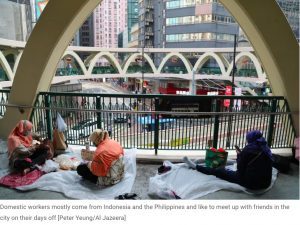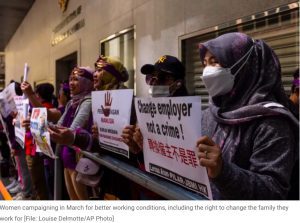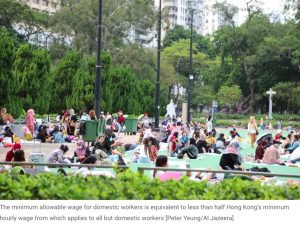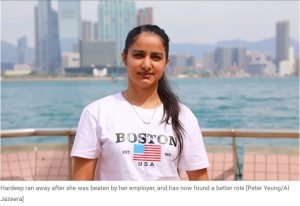Image: Women employed as domestic workers in Hong Kong are demanding the same rights as other workers [Peter Yeung/Al Jazeera]
After years of exploitation and abuse, Hong Kong’s 340,000 migrant domestic workers are fighting back in the courts.
The same day that Sukhi* landed in Hong Kong in April 2018 after a long flight from India, she was forced to start work.
So began a years-long trauma trapped in slave-like conditions.
“I thought I would have a better life,” Sukhi told Al Jazeera, recalling how her male employer confiscated her phone and passport. She was just 21 years old, and it was her first time travelling overseas.
Later joined by her sister, she had to work 16-hour days, cleaning, cooking, and tending to the man’s children — as well as servicing clients in his beauty salon. “But there were no happy moments.”
For decades, Hong Kong’s 340,000 migrant domestic workers have faced abuse and exploitation, despite the economic and social benefits they bring to the Chinese-ruled territory. Lawyers, campaigners and workers blame a combination of low pay, weak labour laws, lax prosecution of wrongdoing by employers and punitive government policy.
But now the women are fighting back — in the courts and on the streets.
In January, a Hong Kong labour tribunal ruled in favour of Sukhi and her younger sister in a case against their former employer, who now faces significant fines and potentially jail time.

He was found to have illegally forced them to work a second job in his beauty salon and, during the pandemic, paid them an illegal monthly salary of just 1,500 Hong Kong dollars ($191). The sisters were also subject to regular abuse and humiliation. Once, after the employer found food residue on a plate Sukhi had washed, they rubbed it on her face as punishment.
“I feel like my life is just starting,” said Sukhi, who decided to confront the employer last May after she was put in contact with HELP for Domestic Workers, a local nonprofit that provides shelter, basic supplies and legal advice to the women.
‘Lifeline to families’
Sukhi and her sister’s experience is not an isolated case.
Research in 2016 by the Justice Centre, a local nonprofit, found 18 percent of domestic workers suffered physical abuse, 66 percent were victims of exploitation, and 1 in 6 were in a situation of forced labour. On average, the more than 1,000 domestic workers surveyed each worked 71.4 hours a week. In 2020, while the city was under strict lockdown, cases of sexual abuse and harassment reportedly tripled.

The fallout of that abuse continues to surface.
In February, a court ordered a Hong Kong couple — who had already been sentenced to jail time — to pay 868,600 Hong Kong dollars ($110,652) to their former domestic worker, an Indonesian woman, after they were found guilty of years of abuse.
The court heard how they had burned her with a hot iron, beaten her with a bicycle chain and, on one occasion, tied her to a chair without food while they flew off on a holiday to Thailand.
But it is not just the abuse or the risk of slave-like conditions; the women — mostly from Indonesia and the Philippines — also face institutional obstacles that make it hard for them to escape even dangerous situations, according to critics.
Under Hong Kong’s so-called “two-week” rule, domestic workers must leave the city within two weeks if they lose their job, making them less likely to leave abusive employers for fear of being deported. Under “live-in” laws, they must live in their employers’ homes, raising the likelihood of overworking and often forcing them to sleep in a tiny space at best, or the floor at worst.

They are allowed just one day off a week and, unlike other migrant workers, will never receive welfare benefits or the right to citizenship.
“Foreign domestic workers in Hong Kong are seen as tools more than humans,” said Germain Haumont, a lawyer who has studied the sector. “The second-class status they are assigned is discriminatory in essence. This status is legally determined in Hong Kong, both in labour law and immigration law.”
Migrant domestic workers, almost entirely women, were first encouraged to move to Hong Kong in the 1970s in order to fill the needs of a city that was rapidly growing from an industrial manufacturing hub into a global financial centre.
Representing nearly one in 10 of all Hong Kong workers, many families depend on them for housekeeping and to look after their children and elderly parents. According to a report by local NGO Enrich, 110,000 mothers in Hong Kong were able to return to work because of the help provided by domestic workers.

Many also send a large proportion of their wages to their own families.
“These women are lifelines to families back at home,” said Avril Rodrigues of HELP for Domestic Workers. “They make strong contributions to Hong Kong’s economy. They are all here on legal visas. But they face toxic working conditions.”
‘Slave wage’
A damning report published in March by the United Nations called for Hong Kong to amend the “two-week” and “live-in” rules and to apply the statutory minimum wage to migrant domestic workers “with a view to enabling [them] full enjoyment of their rights”. It also raised concerns over “exploitative practices by employers” and said complaints are “not adequately followed up on by labour inspection authorities”.
A spokesperson for Hong Kong’s Labour Department said in a statement to Al Jazeera that the government “attaches great importance to safeguarding the rights of foreign domestic helpers” and that “we do not tolerate any exploitation or abuse”.
They added domestic workers “enjoy the same employment rights and protection as local workers under Hong Kong laws”, including food, accommodation, medical treatment and a minimum allowable wage of 4,730 Hong Kong dollars ($603) a month.
But that is less than a quarter of Hong Kong’s median monthly wage, which was 19,100 Hong Kong dollars ($2,433) last year, and the equivalent of less than half the minimum wage, which is 40 Hong Kong dollars ($5.10) an hour for everyone except domestic workers.
For Shiela Tebia Bonifacio, chairperson of Gabriela Hong Kong, an alliance of Filipina women migrants organisations, that is not enough.
“We are on a slave wage,” she said.
Bonifacio, who arrived in Hong Kong from the Philippines in 2007 as a 23-year-old, helps lead public information drives with workers who she says often know little about their rights. The group offers counselling for those who are “overworked and undervalued”, blood pressure checks to monitor stress, and volleyball games to build friendships.

Bonifacio knows all too well the inhumane ways workers can be treated. She was forced to sleep on the floor, and her “non-stop” days would begin at 5am. Worse, she was sexually abused by the elder son of the first family she worked for.
“I was afraid and humiliated by the family,” she told Al Jazeera.
Her experiences and those of fellow workers have fuelled her demands for change.
In 2012, their campaigns helped secure a ban on domestic workers being forced to clean windows, after several women fell to their deaths. Six years later, domestic workers won the right to attend Labour Tribunals remotely, which meant they could pursue claims even if they had left the city.
“Without our movement, there would be no change for us migrant workers,” said Bonifacio.
But there is still a long way to go. Bonifacio says that exploitation remains rife and there are other issues, such as a requirement for employment to be processed by agencies, which demand high fees from workers, and in some cases, debt bondage.
Forging a better future
In 2021, the spread of COVID-19 cases in Hong Kong led to domestic workers being on call 24 hours, with 40,000 of them reportedly not receiving a single day off.

Some were fired — and made homeless — by their employers when they tested positive for the virus. As a result of their non-permanent status, the women were also excluded from support vouchers given to millions of the city’s residents.
“The lockdown meant they could not have a single rest day for eight or nine months. It has led to a mental health crisis,” said Rodrigues. “And some had to sleep in parks, under bridges, pushed into homelessness.”
More recently, controversy has raged over a government crackdown on so-called “job hopping”, where domestic workers terminate their two-year contracts early to find another employer.
In March, an eight-week public consultation was launched over proposals to only allow a change of employer before the end of the contract in “exceptional circumstances”, such as an employer leaving Hong Kong or dying.
No other workers are tied to such rules, and domestic workers argue it is their right to be able to change jobs.
“When did changing employers become a crime?” said Bonifacio. “This will force women to stay with abusive employers.”
The debate over the rights of domestic workers is only likely to become more intense as Hong Kong’s society ages and families rely increasingly on live-in carers.

The government estimates the city will need 600,000 migrant domestic workers by 2047.
Increasingly those women are determined that their future should not be like the past.
“What I’ve gone through, I don’t want the same thing to happen to other girls,” said Hardeep, a 28-year-old worker who last year ran away from an employer who beat her.
She has now found a new, caring family and dreams of opening a beauty salon one day. “Life is so much better,” she said. “When you stand for yourself, God will help you.”
*Some names have been changed to protect identities.
